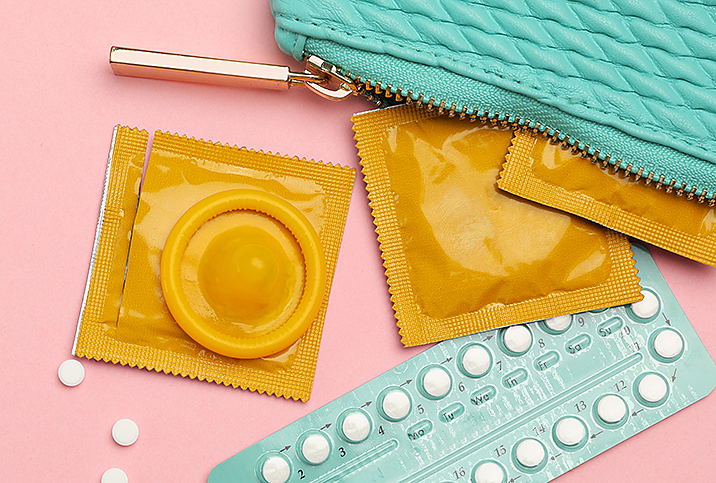Wait…You Can Get Pregnant While on Your Period?!

Ever thought you've got the green light to have unprotected sex because you're riding the crimson wave? Think again: It's definitely possible to get pregnant while you're on your period. Uncommon, sure, but possible.
How is a menstrual cycle measured?
The menstrual cycle is counted from the first day of one period to the first day of the next. And, as you probably know, your period—aka your menstruation, when the blood and tissue lining the uterus is shed from the body over the course of around four to eight days—occurs once a month, following (on average) a 28-day schedule.
On that time line, ovulation occurs about two weeks before your period, said Rashmi Kudesia, M.D., reproductive endocrinology and infertility (REI) specialist and medical advisor at SimpleHealth, a tele-health provider of women's reproductive wellness.
When is a woman most likely to get pregnant?
The day of ovulation, when an egg is released from an ovary, is when a woman is most likely to get pregnant. But "there is a roughly five- to six-day fertile window each month: the day of ovulation and the five or so days leading up to it," Kudesia said. Considering that sperm can live up to five days within the female reproductive tract, it could still be present for ovulation days later, she added.
That's especially true because not every woman's body follows a 28-day menstrual cycle. "It's actually a minority of women that have a textbook cycle," Kudesia said, and it's entirely possible (and normal!) to have periods that occur 24 days to 38 days apart, according to 2011 research published in the Seminars in Reproductive Medicine.
While some women's periods arrive like clockwork, others can have periods that fluctuate, sometimes swinging from 26 days apart one month to 30 days apart the next month. That's normal, too—but those types of time lines make predicting ovulation a little more difficult. For example, on a 21-day cycle, ovulation would occur around day seven; on a 35-day cycle, it would happen around day 21.
Your odds of an accidental period pregnancy are higher if your menstrual cycle falls on the shorter end of that spectrum. "If someone has a short follicular phase—the first half of the menstrual cycle, from period to ovulation—they may indeed ovulate while still finishing their period," Kudesia explained.
So let's do the math: Say you have a period that comes every 25 days and lasts for eight days. If you had unprotected sex on the last day of your period, that sperm could survive until you ovulate—potentially resulting in a pregnancy.
Should you track your period?
Tracking your period can help clue you in to when you may or may not be ovulating. Whether that's on paper or via an app, tracking allows you to see ongoing shifts in your dates, and understand your patterns. "If you find that you're pretty consistent in terms of your cycle length, you can start by subtracting 14 from the total length to guesstimate your date of ovulation," Kudesias said. It can also help you identify trends over time—like how many days of bleeding you experience—and help you spot any irregularities that could be a sign of larger health issues.
But tracking methods are not foolproof, even if you're on your period. So if you're definitely not looking to get knocked up, the best thing you can do for yourself is use protection—beyond the towel you throw down to save your crisp white bed sheets.


















